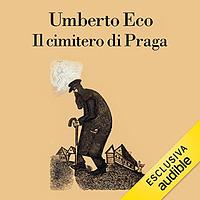You need to sign in or sign up before continuing.
Take a photo of a barcode or cover
Two stars means that I really don't recommend this book unless you are an Umberto Ecco fan or big on conspiracy theories (if you are _susceptible_ to conspiracy theories, please don't read this!). The book is basically an origin story of the 'Protocols of the Elders of Zion', afake book that is used to justify anti-Semitic oppression and violence in the real world. It reads like a 19th century novel and the main character is so cartoonishly bigoted and anti-Semitic that it is at times hard to read.
Yes, I have a problem. I know this is my fourth Eco novel in the space of a year. (What did Cecilie begin when she recommended me [b:The Name of the Rose|119073|The Name of the Rose|Umberto Eco|https://d.gr-assets.com/books/1415375471s/119073.jpg|3138328]?) And I already have a copy of [b:Baudolino|10507|Baudolino|Umberto Eco|https://d.gr-assets.com/books/1442271099s/10507.jpg|234717] lined up and ready to go.
This is a great book about forgery and story-telling and the expansion of myth. It feels wrong to call Simonini an author when we know he is a forger, that he is a propagandist more than anything, and yet his obsession with the "scene of the Prague Cemetery" is such a writerly obsession. He is aware of consumption and distortion once a story is released to the world, and he anticipates that. He looks forward to his scene becoming impossible to source because it has been replicated in too many different places. He looks forward to the additions that readers and other propagandists will make as they adjust the story to their frame of reference or their needs. The mention of the Magi, unnamed and unnumbered in the Bible but given widely-accepted names and histories in the centuries after, tells everything about Simonini's mission.
And I wondered if Eco is thinking of his own writing as well. Especially given how Simonini is telling this story over and over, repeating it to reach not just perfection, but also dissemination and popularity. With all of the conspiracies, not to mention the Masons and the sparse mentions of Rosicrucians, one has to think of [b:Foucault's Pendulum|17841|Foucault's Pendulum|Umberto Eco|https://d.gr-assets.com/books/1396645125s/17841.jpg|11221066]. Does Eco fear that he is repeating himself and reusing material? Perhaps that thread of insecurity is coming from me alone, but I think it is a valid writer's worry--especially when they've been accused of already achieving greatness--that every work is merely Variations on a Theme. I think The Prague Cemetery is that, and yet obviously with my endless seeking out of Eco's works, it's not something that I mind.
This is a great book about forgery and story-telling and the expansion of myth. It feels wrong to call Simonini an author when we know he is a forger, that he is a propagandist more than anything, and yet his obsession with the "scene of the Prague Cemetery" is such a writerly obsession. He is aware of consumption and distortion once a story is released to the world, and he anticipates that. He looks forward to his scene becoming impossible to source because it has been replicated in too many different places. He looks forward to the additions that readers and other propagandists will make as they adjust the story to their frame of reference or their needs. The mention of the Magi, unnamed and unnumbered in the Bible but given widely-accepted names and histories in the centuries after, tells everything about Simonini's mission.
And I wondered if Eco is thinking of his own writing as well. Especially given how Simonini is telling this story over and over, repeating it to reach not just perfection, but also dissemination and popularity. With all of the conspiracies, not to mention the Masons and the sparse mentions of Rosicrucians, one has to think of [b:Foucault's Pendulum|17841|Foucault's Pendulum|Umberto Eco|https://d.gr-assets.com/books/1396645125s/17841.jpg|11221066]. Does Eco fear that he is repeating himself and reusing material? Perhaps that thread of insecurity is coming from me alone, but I think it is a valid writer's worry--especially when they've been accused of already achieving greatness--that every work is merely Variations on a Theme. I think The Prague Cemetery is that, and yet obviously with my endless seeking out of Eco's works, it's not something that I mind.
dark
informative
mysterious
tense
medium-paced
Plot or Character Driven:
A mix
Strong character development:
Complicated
Loveable characters:
No
Diverse cast of characters:
Complicated
Flaws of characters a main focus:
Yes
Graphic: Antisemitism
challenging
slow-paced
Plot or Character Driven:
Plot
Strong character development:
No
Loveable characters:
No
Diverse cast of characters:
No
Flaws of characters a main focus:
Yes
Really been gripped by this Eco novel. I am a big fan of his style, even though this book was sometimes hard to get through.
Not because of his writing style, it's astoundingly beautiful, but mostly because the story will leave you feel very uncomfortable. Placed in the early to late 19th century, the conspiracy theories but especially the harsh reality of that timeperiods anti-Semitism leave you with a bitter taste.
The story is well build up, weaving politics from Garibaldi to the Paris commune in with psychology, religion and even long ramblings on the main storytellers love for food.
Not a book for everyone, but certainly one for me.
Not because of his writing style, it's astoundingly beautiful, but mostly because the story will leave you feel very uncomfortable. Placed in the early to late 19th century, the conspiracy theories but especially the harsh reality of that timeperiods anti-Semitism leave you with a bitter taste.
The story is well build up, weaving politics from Garibaldi to the Paris commune in with psychology, religion and even long ramblings on the main storytellers love for food.
Not a book for everyone, but certainly one for me.
I like Eco's writing style, but I didn't like anything else about it.
Giving up on this one . . . too many books to read . . . too little time.
DNF. Maybe I’ll come back to it later, but right now this copy has a one-way ticket to goodwill.
challenging
dark
slow-paced
Plot or Character Driven:
A mix
Strong character development:
No
Loveable characters:
No
Diverse cast of characters:
No
Flaws of characters a main focus:
Yes
My grasp of 19th-Century West European history is a little too rusty for me to fully appreciate this, I think. Even so, this is a great read, and highly pertinent in a Western Bloc where fake news and conspiracies to unite partisans behind conspiracy theories run amok. The only fictional characters and aliases are the protagonist/s and his/their own false identities - but this is no mere period piece. It's just as much about today as it is about conspiracy theories of the 19th Century.
The Prague Cemetery opens with 14 pages of the narrator describing just how much he hates pretty much everyone. If that’s not to your taste you can pretty much put the book down there. His vitriolic episodes are briefer from there on, but his hatred of everyone and everything except forgery, good food, and the satisfaction of seeing someone murdered because of false evidence he created is a constant thread throughout the rest of the book.
Simonini makes his living largely on forgeries and fraud. After he creates false evidence that sees his employer imprisoned, the government realises just how useful he could be in doing away with enemies of the state - whether it’s by creating false evidence to put in the hands of the courts, or publishing false news. As he hones his skill, the reach of his false news grows from from the occasional publication in pre-existing broadsheets and newsletters to a whole range of newspapers and magazines wholly devoted to entirely fabricated stories intended to drum up xenophobia and antisemitism. Sound familiar?
Maybe some of the book is a little ambiguous when it comes to Eco’s politics. His protagonist is a key figure in the fake news that government and shadow-government groups are using to twist the population’s emotions and opinions to serve their needs, after all. But he devotes plenty of the book to tearing down exactly this kind of thing:
"Patriotism is the last refuge of cowards; those without moral principles usually wrap a flag around themselves, and the bastards always talk about the purity of the race... The meaning of identity is now based on hatred, on hatred for those who are not the same."
And later, even more reminiscent of Trump (though I don’t doubt that the current situation in Italy weighs even more heavily on Eco’s mind):
"The stupidity of these people is such that even today, if I were to say I’ve been fooling them, they wouldn’t believe me."
The parallels to the banal horror of today’s media and politics, and the book’s central message, will be as clear as daylight to anyone who already agrees with Eco. Other reviews here are clear evidence of that. I just hope the moral of the story doesn’t fly over the heads of those inevitable readers who’ll be drawn to the book because they see themselves in Simonini - the ones who are in reality equivalent to the densest and most credulous of his believers.
The Prague Cemetery opens with 14 pages of the narrator describing just how much he hates pretty much everyone. If that’s not to your taste you can pretty much put the book down there. His vitriolic episodes are briefer from there on, but his hatred of everyone and everything except forgery, good food, and the satisfaction of seeing someone murdered because of false evidence he created is a constant thread throughout the rest of the book.
Simonini makes his living largely on forgeries and fraud. After he creates false evidence that sees his employer imprisoned, the government realises just how useful he could be in doing away with enemies of the state - whether it’s by creating false evidence to put in the hands of the courts, or publishing false news. As he hones his skill, the reach of his false news grows from from the occasional publication in pre-existing broadsheets and newsletters to a whole range of newspapers and magazines wholly devoted to entirely fabricated stories intended to drum up xenophobia and antisemitism. Sound familiar?
Maybe some of the book is a little ambiguous when it comes to Eco’s politics. His protagonist is a key figure in the fake news that government and shadow-government groups are using to twist the population’s emotions and opinions to serve their needs, after all. But he devotes plenty of the book to tearing down exactly this kind of thing:
"Patriotism is the last refuge of cowards; those without moral principles usually wrap a flag around themselves, and the bastards always talk about the purity of the race... The meaning of identity is now based on hatred, on hatred for those who are not the same."
And later, even more reminiscent of Trump (though I don’t doubt that the current situation in Italy weighs even more heavily on Eco’s mind):
"The stupidity of these people is such that even today, if I were to say I’ve been fooling them, they wouldn’t believe me."
The parallels to the banal horror of today’s media and politics, and the book’s central message, will be as clear as daylight to anyone who already agrees with Eco. Other reviews here are clear evidence of that. I just hope the moral of the story doesn’t fly over the heads of those inevitable readers who’ll be drawn to the book because they see themselves in Simonini - the ones who are in reality equivalent to the densest and most credulous of his believers.



